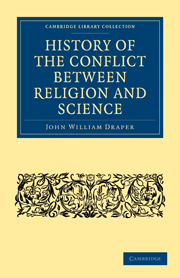Book contents
- Frontmatter
- Preface
- Contents
- CHAPTER I THE ORIGIN OF SCIENCE
- CHAPTER II THE ORIGIN OF CHRISTIANITY.—ITS TRANSFORMATION ON ATTAINING IMPERIAL POWER.—ITS RELATIONS TO SCIENCE
- CHAPTER III CONFLICT RESPECTING THE DOCTRINE OF THE UNITY OF GOD.—THE FIRST OR SOUTHERN REFORMATION
- CHAPTER IV THE RESTORATION OF SCIENCE IN THE SOUTH
- CHAPTER V CONFLICT RESPECTING THE NATURE OF THE SOUL.—DOCTRINE OF EMANATION AND ABSORPTION
- CHAPTER VI CONFLICT RESPECTING THE NATURE OF THE WORLD
- CHAPTER VII CONTROVERSY RESPECTING THE AGE OF THE EARTH
- CHAPTER VIII CONFLICT RESPECTING THE CRITERION OF TRUTH
- CHAPTER IX CONTROVERSY RESPECTING THE GOVERNMENT OF THE UNIVERSE
- CHAPTER X LATIN CHRISTIANITY IN RELATION TO MODERN CIVILIZATION
- CHAPTER XI SCIENCE IN RELATION TO MODERN CIVILIZATION
- CHAPTER XII THE IMPENDING CRISIS
- INDEX
CHAPTER IV - THE RESTORATION OF SCIENCE IN THE SOUTH
Published online by Cambridge University Press: 29 August 2010
- Frontmatter
- Preface
- Contents
- CHAPTER I THE ORIGIN OF SCIENCE
- CHAPTER II THE ORIGIN OF CHRISTIANITY.—ITS TRANSFORMATION ON ATTAINING IMPERIAL POWER.—ITS RELATIONS TO SCIENCE
- CHAPTER III CONFLICT RESPECTING THE DOCTRINE OF THE UNITY OF GOD.—THE FIRST OR SOUTHERN REFORMATION
- CHAPTER IV THE RESTORATION OF SCIENCE IN THE SOUTH
- CHAPTER V CONFLICT RESPECTING THE NATURE OF THE SOUL.—DOCTRINE OF EMANATION AND ABSORPTION
- CHAPTER VI CONFLICT RESPECTING THE NATURE OF THE WORLD
- CHAPTER VII CONTROVERSY RESPECTING THE AGE OF THE EARTH
- CHAPTER VIII CONFLICT RESPECTING THE CRITERION OF TRUTH
- CHAPTER IX CONTROVERSY RESPECTING THE GOVERNMENT OF THE UNIVERSE
- CHAPTER X LATIN CHRISTIANITY IN RELATION TO MODERN CIVILIZATION
- CHAPTER XI SCIENCE IN RELATION TO MODERN CIVILIZATION
- CHAPTER XII THE IMPENDING CRISIS
- INDEX
Summary
By the influence of the Nestorians and Jews, the Arabians are turned to the cultivation of Science.—They modify their views as to the destiny of man, and obtain true conceptions respecting the structure of the world.—They ascertain the size of the earth, and determine its shape.—Their khalifs collect great libraries, patronize every department of science and literature, establish astronomical observatories.—They develop the mathematical sciences, invent algebra, and improve geometry and trigonometry.—They collect and translate the old Greek mathematical and astronomical works, and adopt the inductive method of Aristotle.—They establish many colleges, and, with the aid of the Nestorians, organize a public-school system.—They introduce the Arabic numerals and arithmetic, and catalogue and give names to the stars.—They lay the foundation of modern astronomy, chemistry, and physics, and introduce great improvements in agriculture and manufactures.
“In the course of my long life,” said the Khalif Ali, “I have often observed that men are more like the times they live in than they are like their fathers.” This profoundly philosophical remark of the son-in-law of Mohammed is strictly true; for, though the personal, the bodily lineaments of a man may indicate his parentage, the constitution of his mind, and therefore the direction of his thoughts, is determined by the environment in which he lives.
When Amrou, the lieutenant of the Khalif Omar, conquered Egypt, and annexed it to the Saracenic Empire, he found in Alexandria a Greek grammarian, John surnamed Philoponus, or the Labor-lover.
- Type
- Chapter
- Information
- History of the Conflict between Religion and Science , pp. 102 - 118Publisher: Cambridge University PressPrint publication year: 2009First published in: 1875



